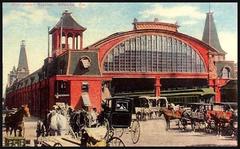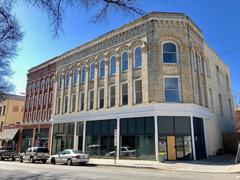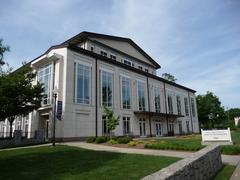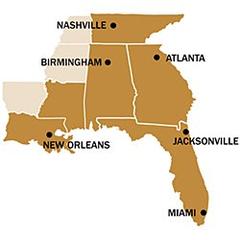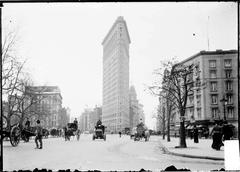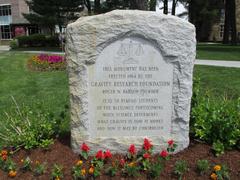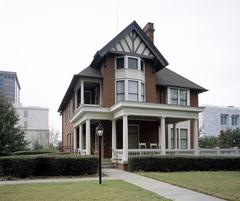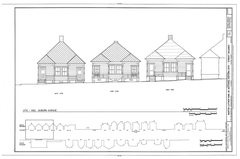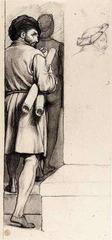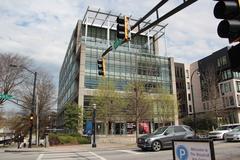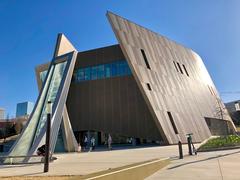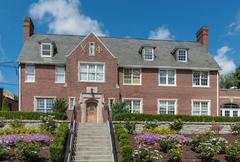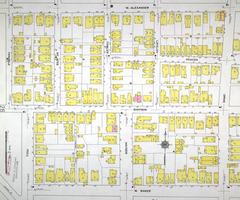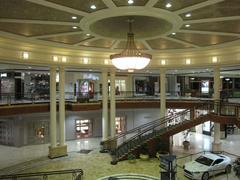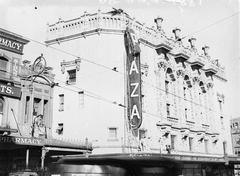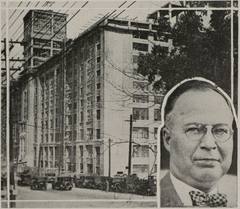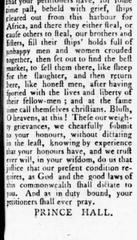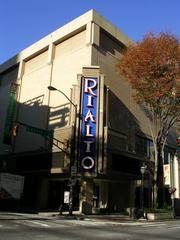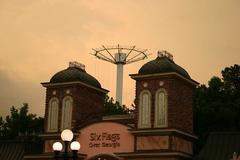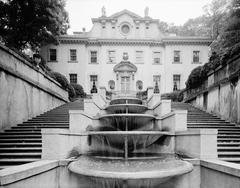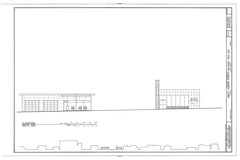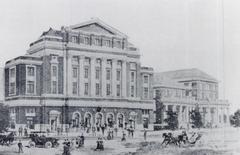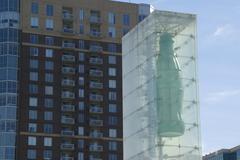
Atlanta City Hall Visiting Hours, Tickets, and Historical Significance: The Essential Guide
Date: 03/07/2025
Introduction
Atlanta City Hall stands as a distinguished emblem of Atlanta’s civic history, architectural innovation, and community pride. As the administrative heart of the city, this landmark offers visitors a unique glimpse into Atlanta’s evolution from a modest 19th-century town to a vibrant metropolis. Designed by G. Lloyd Preacher and completed in 1930, the current City Hall reflects the city’s rapid growth and ambition during a significant period of transformation (Wikipedia; The Clio).
This comprehensive guide delivers everything you need to know about visiting Atlanta City Hall, including its historical context, architectural features, visiting hours, ticketing, accessibility, nearby attractions, and practical tips for a memorable experience.
Table of Contents
- Historical Overview
- Visiting Atlanta City Hall
- Architectural Significance
- Events and Civic Engagement
- Nearby Attractions
- Safety and Visitor Tips
- Frequently Asked Questions (FAQs)
- Conclusion and Call to Action
- References
Historical Overview
Early City Halls: Foundations of Atlanta’s Civic Identity
The first Atlanta City Hall, built in 1854 on Peters’s Reserve, was a two-story brick structure that served as both city administration and court (Wikipedia). During the Civil War, it was used as a Union encampment and temporarily served as the state capitol. The city’s second and third city halls occupied repurposed buildings—first the Chamber of Commerce (1882–1911), then the old Post Office and Customs House (1911–1930)—reflecting the city’s growth and practical approach to civic infrastructure (The Clio).
The 1930 City Hall: Architectural Ambition
By the late 1920s, Atlanta’s expansion demanded a new city hall. In 1926, voters approved a $1 million bond, and construction began in 1928 on land historically significant for having survived General Sherman’s Civil War occupation (SAH Archipedia). Opened in 1930 at 68 Mitchell Street SW, the new City Hall was designed by G. Lloyd Preacher, whose vision fused Art Deco with Neo-Gothic elements to create a distinctive civic landmark.
Materials and Decorative Elements
The building showcases locally sourced Georgia marble, granite, terra cotta, and brick (The Clio). Cream-colored terra cotta tiles, green decorative bands, and striking white marble adorn the exterior. The ornate bronze doors open to a marble-clad lobby, with double staircases, intricate bronze fixtures, and detailed terra cotta ornamentation—showcasing the craftsmanship and artistry of the era (SAH Archipedia).
Renovations and Preservation
Over the decades, City Hall has adapted to Atlanta’s growing needs. Major restoration in 1986 included a new annex, providing space for essential municipal services. Recognized as a City of Atlanta Landmark Building (1989) and listed on the National Register of Historic Places (1983), City Hall’s preservation reflects Atlanta’s commitment to its architectural heritage (The Clio). In 2003, a 3,000-square-foot green roof was added, integrating sustainability with historic preservation (Wikipedia).
Visiting Atlanta City Hall
Visiting Hours
- Open: Monday through Friday, 8:15 a.m. – 5:00 p.m.
- Closed: Weekends and federal holidays.
- Tip: Always check the official City of Atlanta website for updates or changes to hours.
Tickets and Tours
- Admission: Free. No tickets required for public areas.
- Guided Tours: Available by appointment for groups and educational organizations. Contact the City Hall public affairs office in advance to schedule (City of Atlanta).
- Self-Guided Visits: Main lobby and select corridors are open for self-guided exploration.
Accessibility
- The building is fully accessible, with ramps, elevators, and accessible restrooms.
- Service animals are permitted.
- For specific needs, contact the facilities management office ahead of your visit.
Security Protocols
- All visitors must enter through designated security checkpoints.
- Present valid photo ID and pass through metal detectors. Bags may be inspected.
- Arrive early to allow time for screening, especially before public meetings.
Architectural Significance
Exterior Features
- Style: A synthesis of Art Deco and Neo-Gothic Revival, rare among civic buildings in the South (SAH Archipedia).
- Materials: Georgia marble, granite, terra cotta, and brick.
- Highlights: Vertical piers, decorative spandrels, ornate bronze doors, and an imposing tower.
Interior Highlights
- Lobby: Marble floors and staircases, bronze elevator doors, and intricate ceiling ornamentation.
- Council Chambers: Wood-paneled with detailed carvings, reflecting the dignity of civic governance.
- Stained Glass: Depicts scenes from Atlanta’s history and civic life.
Symbolism and Civic Identity
The combination of Gothic verticality and Art Deco geometry reflects Atlanta’s ambition and optimism during the city’s era of rapid expansion. The building’s grandeur and detailing were designed to evoke confidence in municipal governance (Wikipedia: Architecture of Atlanta).
Relation to Surrounding Landmarks
City Hall’s location fosters a civic axis with the nearby Georgia State Capitol, Centennial Olympic Park, and other historic sites, creating a central hub for Atlanta’s government and community engagement (gabusinessandlifestyle.com).
Events and Civic Engagement
City Hall is the venue for Atlanta City Council meetings, committee hearings, and public ceremonies. Many events are open to the public, offering insight into local governance. Schedules and agendas are posted online (City of Atlanta). Participation in public comment periods is encouraged for those interested in civic affairs.
Nearby Attractions
City Hall’s central downtown location places it within walking distance of:
- Georgia State Capitol: Historic tours and exhibits.
- Centennial Olympic Park: Home to the Georgia Aquarium, World of Coca-Cola, and National Center for Civil and Human Rights (Explore Georgia).
- Atlanta History Center: In-depth exhibits on Atlanta’s story (Explore Georgia).
- Dining and Coffee: Numerous options nearby (Discover Atlanta).
Safety and Visitor Tips
- Safety: Downtown Atlanta is well-patrolled during business hours (Gr8 Travel Tips). Exercise standard precautions, especially after dark.
- Best Time to Visit: Spring and fall for pleasant weather (Unexpected Atlanta).
- Transit: MARTA is the recommended mode of transport; parking is limited and expensive.
- Photography: Permitted in public areas; respect signage and staff instructions.
- Restrooms: Available on the main floor.
- Accessibility: Fully accessible for visitors with disabilities.
Frequently Asked Questions (FAQs)
Q: What are Atlanta City Hall’s visiting hours?
A: Monday to Friday, 8:15 a.m. to 5:00 p.m.; closed weekends and holidays.
Q: Is there an admission fee or ticket required?
A: No, entry to public areas is free.
Q: Are guided tours available?
A: Yes, by appointment for groups; contact the public affairs office.
Q: Is the building accessible?
A: Yes, with ramps, elevators, and accessible restrooms.
Q: Can I take photos inside?
A: Generally, yes in public areas; check posted signs.
Q: Where can I park?
A: Parking is limited; public transportation is recommended.
Conclusion and Call to Action
Atlanta City Hall is more than a seat of government—it is a living monument to Atlanta’s resilience, growth, and civic spirit. Its Art Deco and Neo-Gothic architecture, rich history, and central role in community life make it a must-visit destination. Enhance your experience by exploring nearby cultural sites, attending public events, and using digital resources like the Audiala app for guided tours (Audiala).
Plan your visit today, and connect with the heart of Atlanta’s past, present, and future.
References
- Atlanta City Hall - Wikipedia
- Atlanta City Hall: Visiting Hours, Tickets, History, and Nearby Attractions - The Clio
- Atlanta City Hall, Georgia - SAH Archipedia
- Historic Homes & Architectural Landmarks of Atlanta - GA Business and Lifestyle
- Discover Atlanta Visitor Guides - Discover Atlanta
- Audiala App for Guided Tours - Audiala
- Unexpected Atlanta - FAQ
- Lonely Planet - Atlanta Tips
- Buildings DB - Atlanta City Hall
- Explore Georgia - Guide to Atlanta
- Gr8 Travel Tips - Atlanta Georgia Travel Tips









